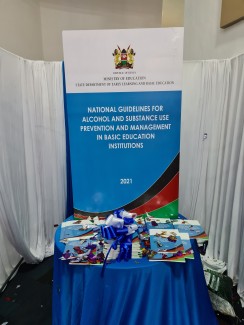Kenya launches National Guidelines for Alcohol and Substance Use Prevention and Management in Basic Learning Institutions, 2021

Kenya has added another landmark in substance use prevention and management. In the midst of a pandemic and unprecedented situation, Kenya has developed and launched the National Guidelines for Alcohol and Substance Use Prevention and Management in Basic Education Institutions, 2021.
The Kenya National Education Sector Strategic Plan (2018-2022) prioritises mainstreaming of crosscutting and contemporary issues and value system in education and training. One of its envisioned goal is to reduce school violence, radicalisation, extremism, drug and substance abuse by developing multi-sectoral frameworks to guide prevention interventions and developing protection systems including counselling and supportive referrals for learners.
According to findings from surveys conducted by NACADA, targeting secondary schools (2016) and primary schools (2018) showed that majority of schools did not have comprehensive policies on alcohol and drug abuse. It was also noted that the approach has been sporadic one-off sensitizations, use of scary tactics, testimonials by ex-drug users, suspension or expulsion from school, random inspection and drug tests and referral for counselling services. Research has proven that many of these approaches do not work.
The UNODC International Standards on Drug Use Prevention (2015) have also confirmed that non-interactive teaching methods like lecturing, providing information only and non-structured dialogue-based sessions do not yield positive results in drug use prevention among children. The Standards assert that the most effective approaches in schools shun stand-alone, single event activities and embrace ongoing, comprehensive and development stages appropriate strategies.
It is against this background that the National Authority for the Campaign Against Alcohol and Drug Abuse (NACADA) partnered with the Ministry of Education to develop the guidelines. The guidelines aim to promote a safe and healthy environment free form alcohol and substance use to enable learners realize their full potential. They provide a blueprint for heads of basic institutions, teachers, and care givers in responding effectively to alcohol and substance use issues within the school environment. They focus on supply reduction, preventive education, incident management, counselling, referral and support.
Speaking during the launch, the Cabinet Secretary for Education Prof George Magoha affirmed that the guidelines are timely and their implementation shall provide a framework to deal with both drug supply suppression and drug demand initiatives in learning institutions. “Our culture allows abuse of drugs and alcohol in our homes, schools and communities. Children learn by seeing. We need to model the attitudes, values and behaviour we want to see in our children.”
A copy of the National Guidelines for Alcohol and Substance Use Prevention and Management in Basic Education Institutions, 2021 is available here or on the NACADA website www.nacada.go.ke .